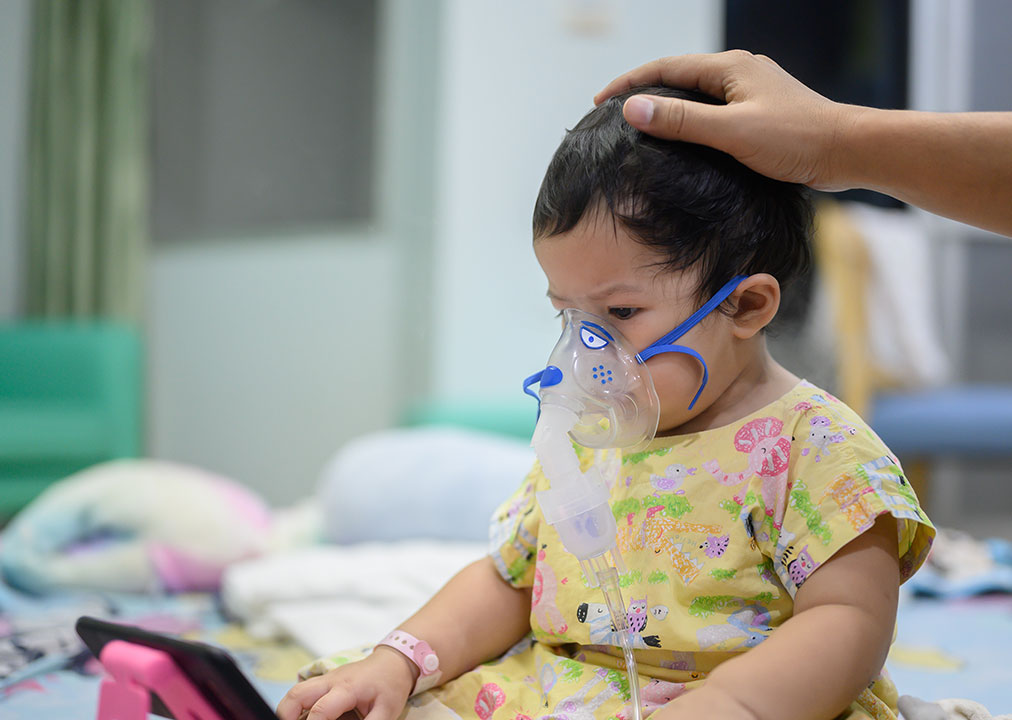Study reveals the heavy emotional toll of having a baby hospitalised with RSV
New research suggests that parents of infants hospitalised with respiratory syncytial virus (RSV) face intense stress and anxiety – particularly those from lower-income or minority backgrounds.
- 7 November 2025
- 5 min read
- by Linda Geddes

The emotional toll of RSV
- Most caregivers reported feeling extremely stressed and anxious during their baby’s RSV hospitalisation – with more than 80% feeling helpless and unable to protect their child from pain and painful procedures.
- Stress levels were higher among caregivers from lower-income households or ethnic minorities, indicating that RSV hospitalisations may worsen existing social and financial strains.
- The study highlights the importance of expanding access to new RSV prevention tools such as maternal vaccines and antibody treatments.
Having a baby hospitalised with breathing difficulties is obviously stressful, but a new study shows just how overwhelming it can be – especially for families already facing social or financial challenges.
Parents of infants hospitalised with respiratory syncytial virus (RSV) report intense levels of stress and anxiety – even when the child is otherwise healthy.
The findings underscore the need for better caregiver support and wider access to RSV prevention tools including vaccines, researchers say.
What is respiratory syncytial virus?
RSV is a leading cause of respiratory infection in children worldwide. By the age of two, nearly every child will have been infected with it.
While most experience only mild symptoms such as a cold or ear infection, the virus can sometimes lead to severe illnesses such as pneumonia or bronchiolitis – a condition that inflames the small airways in the lungs, causing coughing, wheezing, rapid or shallow breathing and, in some cases, difficulty feeding.
In the United States alone, more than two million children under five seek medical care for RSV each year – roughly three percent of whom are hospitalised – with infants under three months old at greatest risk of severe illness.
How does having a child hospitalised with RSV affect caregivers?
While previous studies have explored the psychological impact of preterm infants or children with serious underlying health conditions being admitted to hospital with RSV, far less is known about how the experience affects caregivers of otherwise healthy infants – who make up most RSV-related hospitalisations.
To investigate, Dr Lazarus Adua at University of Utah in Salt Lake City, US, and colleagues surveyed 146 caregivers of children aged two and under who were hospitalised with RSV-related lower respiratory tract infections at Primary Children’s and Riverton Hospitals in Salt Lake City during the 2019–2022 RSV seasons. Of these, 109 caregivers also completed a follow-up survey two weeks after their child was discharged.
The caregivers were asked to rate how stressful they found different aspects of their child’s hospitalisation and to report how anxious they felt during the hospital stay and again two weeks after discharge.
What did the study find?
The research, published in PLOS One, identified substantial levels of stress and anxiety among the caregivers. More than half said that most of the situations they were asked about during their child’s hospital stay were very or extremely stressful. In particular, 87% said they felt helpless about how to help their child, 85% were concerned about their child’s unusual breathing, and 81% felt unable to protect their child from pain and painful procedures – all of which they rated as extremely stressful.
Caregivers were very anxious while their child was in hospital. When asked again, two weeks after their child had been discharged, most reported feeling less anxious and more positive – although many reported lingering emotional effects.
Were some caregivers more affected than others?
The researchers also looked at whether caregivers from different backgrounds experienced stress and anxiety differently. They found that caregivers from Hispanic or or other ethnic minority backgrounds, as well as those from lower-income households, tended to feel significantly more stressed and anxious during their child’s hospital stay.
“Our findings are in line with prior studies indicating that ethnic and racial minorities, along with lower-income groups, are more likely to experience and suffer from negative health conditions and outcomes,” the researchers said.
The findings also fit with a well-established theory, known as the stress process theoretical model, which proposes that a stressful event – such as having a child in hospital – can be even more overwhelming for families who already face greater challenges, because it can make them worse. For example, if a family is already struggling socially or financially, a child's hospitalisation can place even more strain on them, leading to higher stress levels.
“In this study, we can conclude that the hospitalisation event likely exacerbated pre-existing social strains related to being economically disadvantaged and coming from an ethnic and/or racial minority background,” the researchers said.
Have you read?
What are the implications of this research?
Having a young child hospitalised with RSV causes significant stress and anxiety for caregivers – even when the child is otherwise healthy. This highlights the need for hospitals to support caregivers emotionally as well as providing medical care. Such support could be especially important for families who are already at higher risk of psychological distress due to social or financial pressures.
The researchers also recommended raising awareness of immunisation strategies that can help prevent RSV-related hospitalisations in young children. These include the maternal RSV vaccine – which enables protective antibodies to pass from mother to baby during pregnancy – and long-lasting antibodies such as nirsevimab. Both aim to shield infants during their early months of life, when they’re most vulnerable to severe illness.
In countries where these preventive approaches have already been introduced, the impact has been dramatic. Recent data from the US Centers for Disease Control and Prevention suggests that hospitalisations of babies due to RSV have fallen by as much as 71% in some areas compared to pre-pandemic levels, largely thanks to these interventions.
“Our findings further support expanded and targeted efforts to reach racial and ethnic minorities [with these immunisation strategies],” Adua and colleagues said. “These populations are often missed in public health campaigns, and this study suggests they suffer the most psychological burdens related to a child’s hospitalisation with RSV.”






